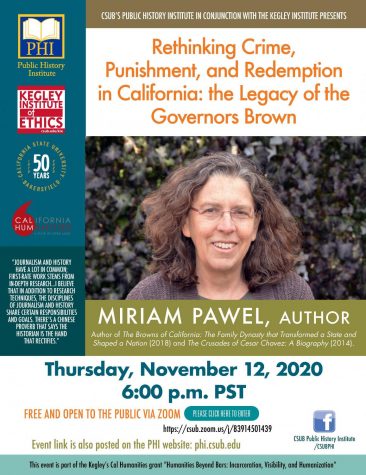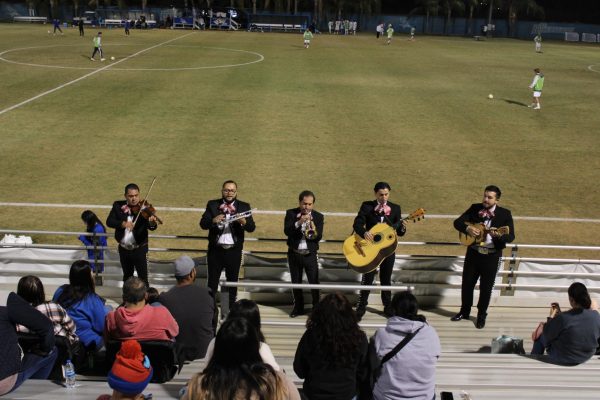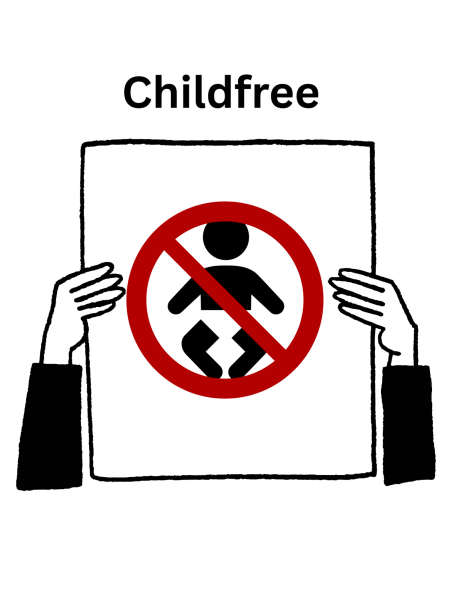Preview: The legacy of the Governers Brown: A webinar with Miriam Pawel
November 12, 2020

Author Miriam Pawel will be returning to CSU Bakersfield virtually on Nov. 12 at 6 p.m. to discuss the long-lasting effects of the Browns’ leadership in the justice system.
“Rethinking Crime, Punishment, and Redemption in California: the Legacy of the Governors Brown” is being hosted by the Kegley Institute of Ethics (KIE) and the Public History Institute (PHI).
Miriam Raub Vivian, professor, History Chair, and Director of the PHI spoke with The Runner about some expectations for the evening.
Vivian stated that Pawel with likely use 30-40 minutes for her lecture, then they will begin the Q&A portion of the event. Vivian states that attendees are invited to submit their questions via the chat function, where all questions will be received privately by the moderator.
Students will be able to submit questions for consideration throughout the duration of the event, although it is unclear how many questions will be answered due to time constraints.
“Her lecture and this event, which was organized by the Public History Institute, is in conjunction with the Kegley Institute of Ethics grant,” Vivian said.
Faculty at CSUB received an email announcement providing information on the evening’s event, aiming to help more Runners hear about the event.
“In this talk, Miriam Pawel will trace the evolution of each man’s thinking and practice, explore the consequences, and place their actions in the context of their guiding beliefs and principles,” the event announcement email to faculty writes.
Pawel has previously spoken to Runners, drawing interest from faculty like Vivian that attended her last lecture.
“She’s been to CSUB before, physically in person, for another Public History Institute event in 2015 for the 50th anniversary of the Delano Grape Strike. She gave a great talk with PowerPoints and images, and she will be doing it again with photos and stuff from her book, but that was excellent. So, it’s kind of nice to welcome her back with this new book,” Vivian said.
Runners are encouraged to tune in for the lecture, Q&A, or both. Historians like Vivian note that it is important for all voters to make sure they take the time to educate themselves whenever possible, as some decisions will affect more than voters may expect.
“We live in the most populous state in the Union, and we are something like the 5th largest economy in the world. So, we’re a kind of nation-state. A lot of what happens in the California has influence in the rest of the country, and it usually gets noticed when even when it didn’t influence those states to adopt those policies,” Vivian said.
Under the Browns’ leadership, California frequently looked for ways to reform the criminal justice system.
According to the email announcement sent to CSUB faculty, the Browns “selected more than a thousand judges, remade California’s highest court (three times), shaped the sentencing structure and its prisons, and issued pardons and commutations.”
An example of California justice legislation falling under the national microscope includes Proposition 17. Californians voted on Nov. 3 to change the state laws to restore the right to vote to all convicted felons after they complete their prison sentence, including parolees.
“[Prop. 17] was on the ballot this time and there will be something else probably, either another effort trying to roll back policy or legislature influence. There’s this evolution of seeking a consensus or agreement on what’s the best way to deal with criminal behavior or drugs, and there’s a lot of disagreement on whether they should be thrown in prison for 20 years or convicted of a misdemeanor,” Vivian said.
Runners are welcome to tune in here at 6 p.m. for more information on how the Browns affected policies today.







